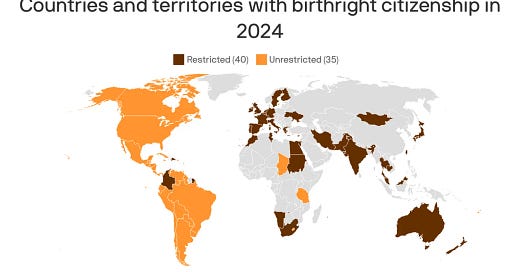Mapped: Birthright citizenship around the world
Countries and territories with birthright citizenship in 2024.
Axios
April Rubin
Countries and territories with birthright citizenship in 2024
World map showing the countries and territories with birthright citizenship in 2024. 40 countries and territories had restricted birthright citizenship and 35 had unrestricted birthright citizenship, according to the World Population Review.
Data: World Population Review; Map: Axios Visuals
President Trump challenged U.S. birthright citizenship the day of his inauguration, attempting to strike down a 19th century constitutional doctrine via executive order.
The big picture: Though a core part of American citizenship, unrestricted birthright citizenship is mostly a facet of the Western Hemisphere.
Many other nations make citizenship conditional on the legal status of the parents or a person's length of residency in the country, per the Library of Congress.
In Africa, Asia and Europe, most countries either don't offer birthright citizenship or offer it conditionally, some through an application process.
What they're saying: "The historical foundation of this principle in the U.S. reflects its aim to eliminate legal inequalities and promote inclusivity," the American Immigration Council said.
Another explanation of its foundation is colonialism, John Skrentny, a sociologist at the University of California, San Diego, told Politifact in 2015 when Trump first raised his qualms with birthright citizenship.
European colonizers, he said, wanted to build populations in North and South America to outnumber Indigenous populations.
"Getting people to move in was a good way to establish authority," Skrentny added.
He pointed out that birthright laws remain in South America, which has historically had fewer immigrants.
Zoom out: Universal birthright citizenship was restricted or abolished in Britain, Ireland, Australia, New Zealand and India in recent decades, the New York Times reported.
Ireland in 2004 ended unrestricted birthright citizenship after 79% of voters supported a constitutional amendment that hinges citizenship on parents' residence and history.
The Dominican Republic's abolition of birthright citizenship in 2013 denationalized about 200,000 people, largely of Haitian descent, according to the Center for Migration Studies.
It was a decision the Inter-American Commission on Human Rights condemned and the Open Society Justice Initiative said was "part of a long history of discrimination against Dominicans of Haitian descent."
Catch up quick: Trump has also faced criticism for rhetoric used to push for more limits on immigration and promote mass deportations.
States and civil rights groups immediately sued his administration after the president signed the birthright citizenship order, which was set to take effect on Feb. 20.
A U.S. district judge sided with four Democratic state attorneys general who argued in lawsuits that the order was unconstitutional, and the decision Thursday temporarily blocked the order nationwide.
Trump's defense of the order was that children whose parents aren't citizens are "not subject to" American jurisdiction as envisioned in the 14th Amendment.
What's next: The case is likely to be appealed to the Supreme Court.
The Justice Department "will vigorously defend President Trump's EO, which correctly interprets the 14th Amendment of the U.S. Constitution," it said in a statement to NBC News.
Axios



